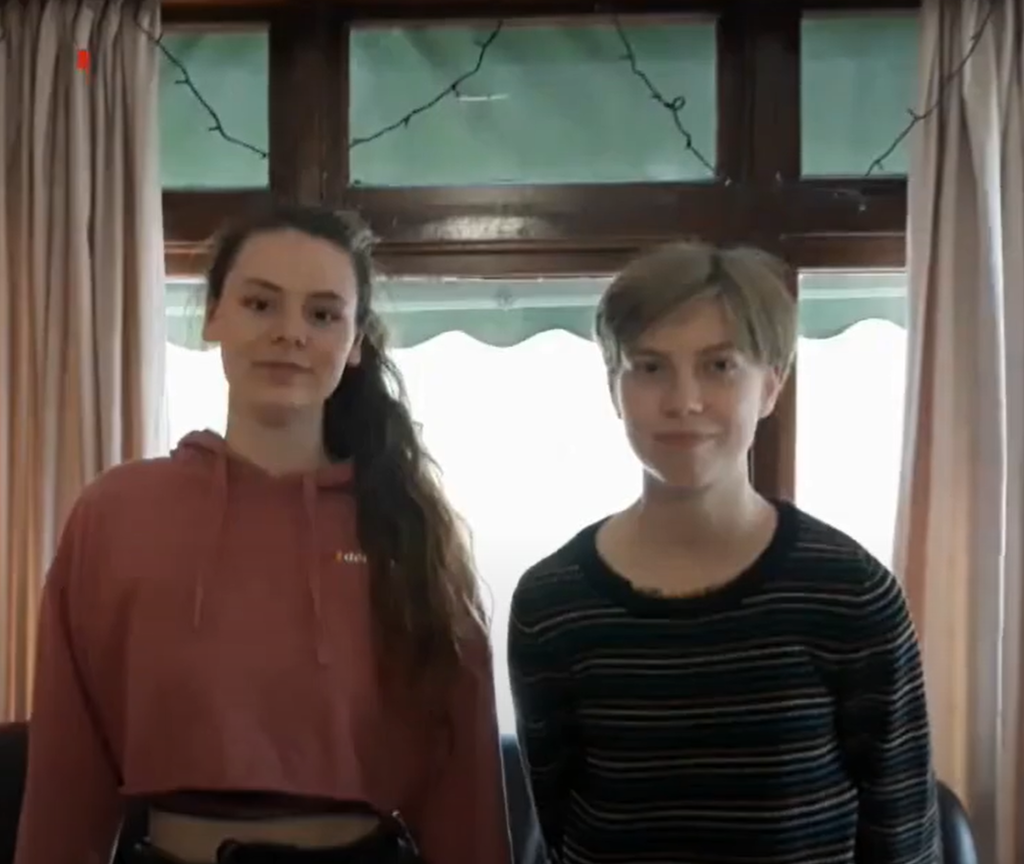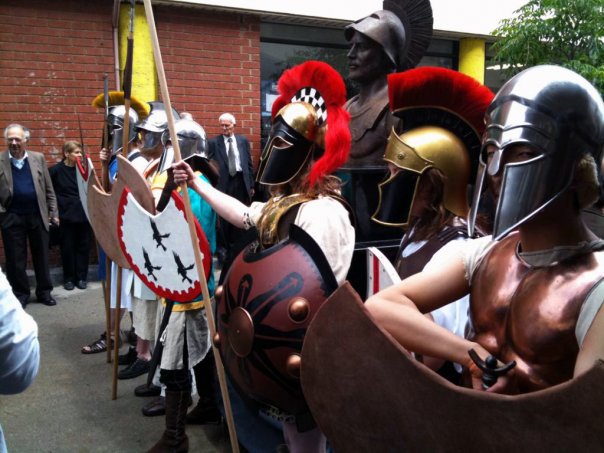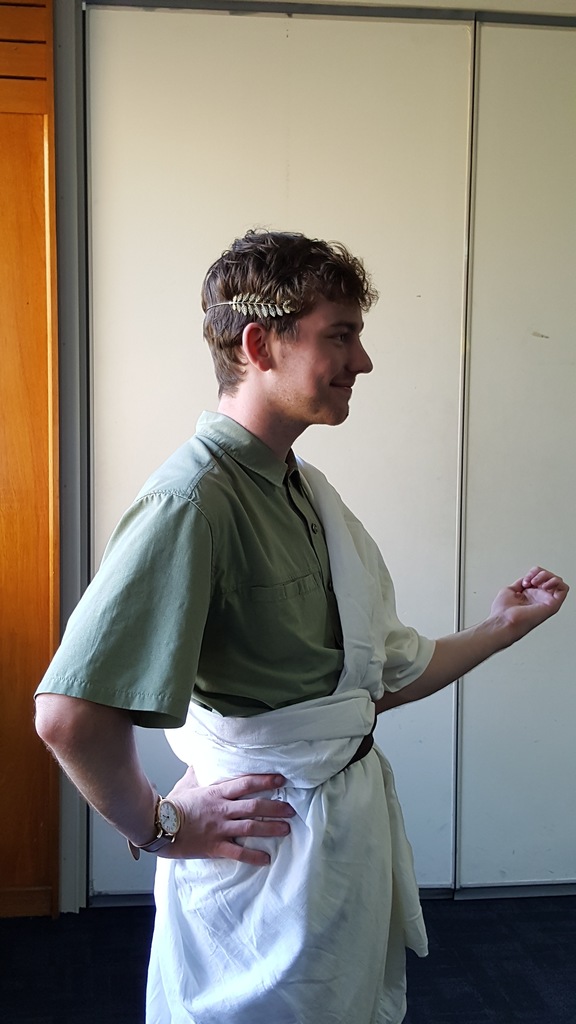This piece (especially with any details pre-2013) borrows much from its predecessor, From MUCAAS to MUCLASS by Dean Hallet, and, like that piece, offers “by no means an exhaustive history…but rather in Herodotian style” a patchwork of events from the long and illustrious history of Classics and Archaeology clubs at the University of Melbourne.
The Early Times (pre-2006)
To begin in the style of Livy, it is generally understood that the first Classics or Archaeology Society at the University of Melbourne, and the story of its origins, have long since been lost to the winds of time. Whispers and rumours in the annals of University history occasionally speak of the ‘Melbourne University Classics Club’, but its story is shrouded in mystery – a task beyond this humble article.
The first club we can find, then, is the Melbourne University Classics and Archaeology Society (MUCAAS), first named as such in the September 2004 newsletter of the Australian Society of Classical Studies, which reports on the undergraduate Classics society at the University settling on the name of MUCAAS. By 2006, as Dean Hallet, the last historian to attempt a recounting of MUCLASS’ tale, joined MUCAAS, its golden age was in full spring.
In the Upper West Wing of the Old Quad, an unassuming locked door (the sort that one might mistake for a storeroom or closet) led to three rooms of MUCAAS heaven, adorned with pictures of sites and artefacts, and filled with “desks, bean bags, cushions…theatre backdrops and props.” Filled with Classics tutors, from these rooms MUCAAS produced Orpheus, its newsletter containing “essay extracts, poetry, travel stories, reviews of ancient themed movies or video games, and fake advertisements for things like second hand chariots.”
MUCAAS’ events included “trivia nights, movie nights and dramatic reading nights” – the last of which fed well into the club’s propensity for theatrical performance, putting on plays every semester or two. By 2003, this had transformed into an entity in its own right, with the club’s theatrical wing, Omniprop Productions, splintering away from MUCAAS for its own set of acclaimed theatrical performances, including an appearance at the 2008 Melbourne Fringe Festival to perform Aristophanes’ Lysistrata.
Collapse and Rebirth (2006-2013)
But this age of prosperity was not to last. MUCAAS was superseded entirely by Omniprop. And then, as Omniprop’s members left the University, both MUCAAS and Omniprop fell apart. By 2010, no sign of either group remained, with MUCAAS’ once-glorious rooms converted into postgraduate work spaces. The only remnant of Classics and Archaeology in the clubs world was the short-lived Melbourne Ancient Re-enactment Society (MARS), focussed on costume–making (especially the equipment of Thracian peltasts). And while it valiantly continued for two years, it was wound down in 2011 due to financial constraints and members becoming too busy to be involved.
It was from these ashes, then, that MUCLASS (Melbourne University Classics and Archaeology Student Society) was born. It borrowed many aspects of its MUCAASian predecessor, choosing to likewise publish editions of Orpheus (some of which remain archived on this website). In its first edition of the magazine, published in 2013, the club promised to “continue in [the] footsteps” of MUCAAS as the club entered a new age. Its events, from “Greek theatre workshops…[to] Ancient Feast[s]”, meshed together aspects of MUCAAS, Omniprop and MARS, reuniting the clubs into a new form built to last.
It also saw a brief attempt to set up this very website, with a parchment-themed design that would remain in place until 2023, as well as the creation of the famous MUCLASS logo, which would hold the club in stead for the next decade. Its clean visual lines and deceptive simplicity allowed it to become a standard for the club, well known by any Classics or Archaeology student as a harbinger of good times.

The Lost Age (2013-2016)
Records fail us over the intervening years. Hallet’s history, published for the revival of Orpheus, leaves us here – and, while it is clear that Orpheus was not long for this world (with no online records showing a second issue in the following semester), little else is known. Many names and faces have undoubtedly left the historical record here, but their legacy undoubtedly continues in many of the club’s traditions and ways which began to emerge over this period.
Turmoil and Triumph (2016-2021)
Our first clear records after Hallet, then, come in the form of the surviving Annual General Meeting (AGM) minutes from 2016. Then, MUCLASS was a small sized club (with only 21 participants at their AGM), running occasional events – with a particular focus on academic and career seminars and a strong partnership with their Postgraduate counterparts, if not much financial activity (in their Quaestor’s words, the club “received no grants, charges no fee…and made no expenditures” over the course of the year). For two years, the struggle for membership numbers would be a constant, with Consuls Nellie Seale and Angus Somerville discussing in 2017 the problems of “a fairly niche potential member base”.
However, the 2017-18 Committee saw the rise of a name who would become synonymous with MUCLASS itself: then-Quaestor Benjamin Cronshaw. And with him came increased use of major events as a means to grow the club, with MUCLASS holding two events a semester, ranging from karaoke night to a mini-conference co-hosted with graduate students. Sound financial management and the help of use of UMSU grants saw the club slowly grow its funds, with slim but present year-to-year surpluses eventually building up a balance to the tune of some $330 by mid-2020.
Cronshaw would go on to be elected Consul twice in a row, first alongside Olivia White (2018-19), and then alongside Phoebe Leggett (2019-20). His tenure saw the club transform, with events rising to 6-7 a semester, including trivia nights, Hellenic Museum visits, board games sessions and more. The surpluses of the years also allowed the committee to abolish the $2.00 membership fee and introduce free membership – a policy that remains to this day.
Yet, especially towards its end, this time was not without great difficulties. Well-known to the committees to come afterwards would be cautionary tales of these days, at one point with troubles so great that a merger with the History Society was put before the membership, only to be soundly rejected – even in the worst of times and the darkest of hours, MUCLASS would keep its dignity, pride and integrity intact rather than be subsumed by another club! The membership struggles also continued, with a year even coming when membership numbers depended on a rainy Clubs Expo day and the foresight of Consul Leggett to bring an umbrella, offering shelter alongside a MUCLASS membership.

These patterns continued into 2020-21, as Consul Leggett successfully sought a second term, elected alongside Daisy Norfolk while Consul Cronshaw returned to his 2017 post of Quaestor. This year saw a solidification of the modern MUCLASS events schedule, with around two events per week. Yet it came at financial cost. While the number is now generally held to have been unnaturally low due to an unfortunate timing of grant reimbursements, it became a point of pride for the following committee that, at the end of this term, the bank account was left with a mere $0.07!
Bold New Frontiers (2021-2022)
However, in so many ways, it was money well spent. The tireless recruitment efforts of Leggett and Norfolk bore fruit at a well-attended and fiercely-contested AGM. Candidates presented bold visions for how they saw the future of the club, and new and exciting ideas took form.
Meg Challis, running for Quaestor, promised “expansion, expansion, expansion!” in her campaign speech, pledging if elected to hold an inaugural ‘Classics Ball’, fundraised without charging a cent in membership fees (her fundraising methods would eventually leave the club with a closing balance totalling around $3100). This promise propelled her to victory, defeating Ben Cronshaw’s run and thus bringing to an end his four years on committee.
Andrew Lim, elected Aedile, had similarly bold plans – promising to reinvigorate educational efforts under the banner of “outreach, outreach, outreach!”, extending connections to disciplines, educational areas and students typically beyond MUCLASS’ reach. Other positions were divided between old and new faces, with Senator Daniel Ševo and Praetor Bridget Bracken joining the team, whilst former Aedile Gilbert Newport and Proconsul Daisy Norfolk returned as Senators to offer some experience.
This committee of contrasts, brought together under the strong leadership of Consuls Hannah Lewis and Abigail Banister-Jones would have to act fast to live up to expectation – and their first idea would become nothing short of MUCLASS legend.
Borne from a desire to develop a framework for successful events in lockdown, the Septathlon – a competitive seven-week series of events where teams could gain points in everything from play recitations to riddle-solving – became a Friday night phenomenon, spawning new myths and legends: stories of the great clashes between Oedpius and the Motherfuckers and Dionysus’ Peeled Grapes (later renamed, after their defeat, to the Grapes of Wrath)
Returning to campus the following year, it transitioned to an in-person form, entitled Septathlon II: Fight for Glory. And while, in the eyes of some, this did never quite reach the heights of its predecessor (intermixed as it was with other educational and social initiatives, from astronomy nights to VCE adverts), it did build towards something even more magnificent: the inaugural SHAPS Hellenic Ball.
Much has been written of this, most notably the recap article written by Consul Banister-Jones). This history shall simply suffice to note that the sheer scale of the operation, tens upon thousands of dollars in costs and coordinated marketing operations across multiple platforms, pushed MUCLASS to a scale hitherto unimaginable – truly the crown jewel of Challis’ mantra of expansion.
But it was not too long before the winds of change blew yet again. Consul Lewis, successfully re-elected, continued in the great tradition of Consuls Leggett and Cronshaw before her. With Proconsul Banister-Jones joining the ranks of the Senate, Lewis was joined in the consulship by former Aedile Andrew Lim, asking the people to “reaffirm that bold new direction…[of] one year ago”, uniting the threads of outreach and expansion that had been pivotal in the previous year. And with an otherwise fresh slate of faces (many prominent names from the Septathlons) forming the new committee, a mixture of continuity and change seemed the way ahead.
Their new policies moderated the new ideas of their predecessors with MUCLASS traditions of old, while adding entirely new flavours to the mix. Eschewing the banner of the Septathlon, they nonetheless incorporated many of its ideas, from trivia conundrums to diplomatic wargaming sessions, while incorporating added academic and careers foci, with work on careers nights, lectures and even a successful bid for the 2023 National Archaeology Student Conference.
A Golden Dawn (2022-present)
Their greatest development, however, was yet to come. Seeking a new, more tech-savvy platform, Senator Erica Hore stumbled across this very website – muclass.wordpress.com – and with it the annals of MUCLASS history as recorded by Hallet. And, in honour of this historical discovery, the committee saw it fit to revisit the old MUCLASS Logo, replacing it in a democratic process to create a new visual brand for this, the second decade of its existence.

What shall come next? Where will the winds buffet MUCLASS? How shall our fates roll on?
We know not.
But, looking over some twenty-odd years of MUCLASS, Omniprop, MARS and MUCAAS, we can be sure of a few things. There will be great trials and tribulations, and even greater triumphs. There will be changes of direction: some that last, and some that do not. But through it all, Classics and Archaeology organisations by the students, for the students, and from the students, shall endure at the University.
So… whether you run for committee, vote at our AGMs or just come along to events: the next chapter, dear reader, is yours to write – and we all can’t wait to see what it says.
PUBLISHED
LEWI ET LIME CONSULIBUS; ANNO X AB MUCLASSE CONDITA
ANNO XIX AB MUCAASE CONDITA; ANNO MMDCCLXXVI AB URBE CONDITA




